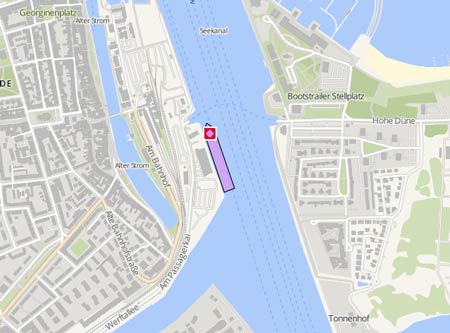LAKE TAUPO
Kurs/Position
vor 1 Min
Die letzten Häfen
Die letzten Wegpunkte
Die neuesten Nachrichten
Case regarding safety concerns settled
The "Morning Miracle"-case which has rumbled on for over five years seems to have finally come to an end this week with both sides claiming victory. In 2007 the UK branch of the Nautilus union, which represents tens of thousands of senior maritime staff, went to war with the UK Government after it had received information that the car carrier, originally destined for flagging in Liberia, had received approval instead for registration under the British flag despite concerns over its safety. The "Morning Miracle" was the first is a series of seven ordered by Zodiac Maritime and a whistleblower within the Safety Shipping Branch of the Maritime and Coastguard Agency (MCA) had passed information to Nautilus that Solas regulations on fire fighting were breached by the vessels design. The vessel relied on carbon dioxide to fuel its fire fighting system yet the canisters of gas were stored outside the main collision bulkhead meaning damage to the vessel might render the system inoperable. Despite the breach of regulations the classification society, Det Norske Veritas (DNV), successfully argued that the design of the ship, being a multi tiered purpose built car carrier, meant that the gas storage was safe, sited as it was way up on the eighth deck, leaving the way clear for the flagging of all seven ships in the UK. The union opposed the decision saying that safety was being compromised and standards lowered simply in a desperate scramble to allow more tonnage to be registered under the red duster. The row continued as Zodiac were criticised for their safety record by Nautilus, a charge the company vehemently denied. The whistleblower in the case of the "Morning Miracle" proved to be Jayan Pillai, employed as a policy manager by MCA and whose name still appears on MCA specialist fire fighting instruction documents. Mr Pillai was sacked by the MCA in 2009 and maintained this was directly due to the revelations of his concerns over the safety issue to the union. Nautilus represented Mr Pillai in 2010 when his case went to the Civil Service Advisory Board, which unanimously recommended that the MCA should re-engage Mr Pillai. The MCA however ignored the Board’s decision, which resulted in the Union’s decision to press ahead with a tribunal case. The hearing was first scheduled to be heard in October 2011, but was delayed as a result of the complexity of the case and the time needed to hear the arguments. Following a five-day hearing in Southampton, during which the union argued that Mr Pillai had been unfairly dismissed after making a public interest protected disclosure and that he suffered victimisation and harassment as a result, the employment tribunal has upheld the Union’s claim that Mr Pillai had been unfairly dismissed. It did not agree however that he was dismissed for having made a public interest disclosure, ruling that this was not well founded. It also stated that his complaints of bullying and suspension as a result of making a public interest disclosure were not well founded and would have been dismissed had they been presented to the tribunal within the prescribed period. The employment tribunal ruled that Mr Pillai was unfairly dismissed due to procedural reasons after charges that he had committed two disciplinary offences relating to the use of a computer memory stick and a breach of trust.
News schreiben

